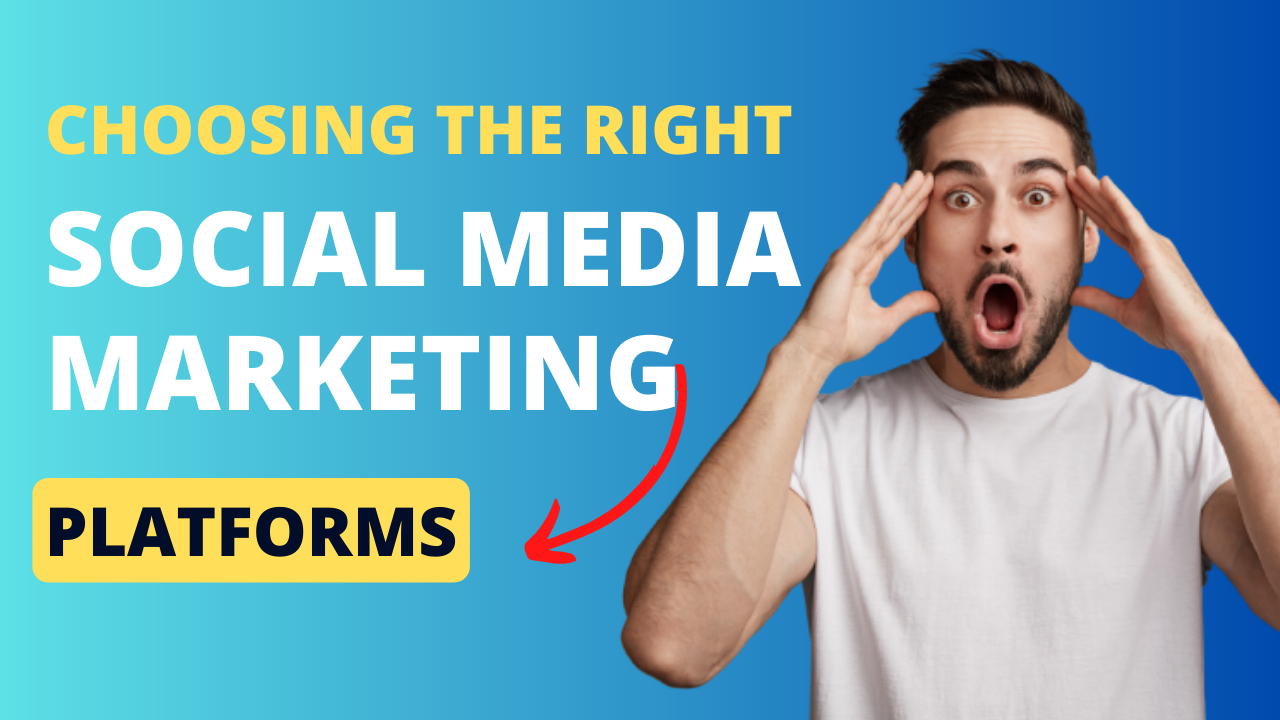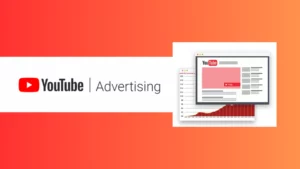Social media marketing has become an essential aspect of modern-day business promotion. With numerous platforms available, it’s crucial to choose the right ones that align with your marketing goals and target audience. In this article, we’ll explore the process of selecting the most suitable social media platforms for your marketing campaigns and discuss the factors to consider. Let’s dive in!
Outline of the Article:
- Introduction
- Definition of social media marketing platforms
- Importance of choosing the right platform
- Understanding Your Target Audience
- Conducting market research
- Defining your target audience
- Analyzing audience demographics and preferences
- Assessing Platform Suitability
- Overview of popular social media platforms
- Examining platform features and functionalities
- Considering platform user demographics and behavior
- Setting Marketing Goals
- Defining your marketing objectives
- Aligning goals with platform capabilities
- Selecting platforms that align with your goals
- Analyzing Competitors
- Identifying competitors’ social media presence
- Evaluating their platform choices
- Learning from their successes and failures
- Evaluating Platform Reach and Engagement
- Examining platform user base and reach
- Analyzing engagement metrics and algorithms
- Determining the potential for organic reach and paid advertising
- Content Strategy and Format
- Understanding the type of content you want to create
- Matching content formats with platform features
- Considering visual and textual content requirements
- Budget and Resources
- Assessing your marketing budget
- Evaluating resource availability
- Choosing platforms that fit your financial and resource constraints
- Testing and Measuring
- Conducting initial platform tests
- Tracking performance metrics
- Making data-driven decisions for optimization
- Adapting to Trends and Changes
- Staying updated with social media trends
- Monitoring platform changes and updates
- Adjusting your strategy accordingly
- Cross-Platform Integration
- Exploring opportunities for cross-platform promotion
- Integrating platforms for a cohesive marketing strategy
- Leveraging platform-specific strengths for maximum impact
- Case Studies and Examples
- Showcasing successful social media marketing campaigns
- Highlighting platform selection strategies
- Providing practical insights and inspiration
- Best Practices and Tips
- Emphasizing the importance of consistent branding
- Encouraging experimentation and learning
- Offering practical tips for platform selection
- Choosing the Right Social Media Marketing Platforms
- Discover: “SOCIAL MEDIA MARKETING FOR BEGINNERS 2023: Learn how to grow your social media with beginner’s strategy updated for this specific year; this book provides … easy and organized knowledge ready for you”
- Conclusion
- Recap of the importance of choosing the right social media marketing platforms
- Encouragement to take a strategic approach
- Final thoughts on the evolving nature of social media marketing
- FAQs
- FAQ 1: How do you choose which platform to use in social marketing?
- FAQ 2: Why is choosing the right social media platform important?
- FAQ 3: Which social media is best for social media marketing?
- FAQ 4: How do I choose social media content?
- FAQ 5: How often should I reassess my platform choices?
Introduction
In today’s digital landscape, social media marketing platforms provide businesses with unparalleled opportunities to reach and engage their target audience. These platforms enable brands to create compelling content, build communities, and drive conversions. However, not all social media platforms are created equal, and choosing the right ones requires careful consideration.
Understanding Your Target Audience

Before delving into platform selection, it’s vital to have a deep understanding of your target audience. Conducting thorough market research and defining your audience personas will help you create a comprehensive profile of the people you want to reach. Analyzing their demographics, preferences, and online behavior will lay a solid foundation for choosing the most effective platforms.
Assessing Platform Suitability

To make informed decisions, it’s essential to have a good grasp of the popular social media platforms available. Each platform offers unique features, functionalities, and user demographics. Consider platforms like Facebook, Instagram, Twitter, LinkedIn, YouTube, and Pinterest, and evaluate how well they align with your target audience and marketing objectives.
Setting Marketing Goals

Defining clear marketing goals is crucial for selecting the right social media platforms. Whether you aim to increase brand awareness, drive website traffic, or generate leads, different platforms cater to various objectives. Assess the capabilities of each platform and choose those that offer the necessary tools to achieve your goals effectively.
Analyzing Competitors

Analyzing your competitors’ social media presence can provide valuable insights into their platform choices. Identify competitors who have a strong online presence and evaluate the platforms they utilize. Learn from their successes and failures to inform your own strategy, but remember to maintain your unique brand identity.
Discover: The Creator Economy ebook
Evaluating Platform Reach and Engagement

The reach and engagement potential of a platform can significantly impact the success of your marketing efforts. Examine each platform’s user base, reach, and engagement metrics. Consider factors like the algorithms that determine content visibility and the potential for organic reach versus paid advertising. This evaluation will help you understand the platform’s effectiveness in reaching your target audience.
Content Strategy and Format

Different social media platforms support various content formats. Whether it’s images, videos, articles, or interactive posts, your content strategy should align with the strengths and limitations of the chosen platforms. Consider the visual and textual content requirements and choose platforms that best showcase your brand’s personality and resonate with your audience.
Budget and Resources

Your marketing budget and available resources play a significant role in platform selection. Consider the costs associated with advertising, content creation, and community management on each platform. Evaluate the available resources within your team and select platforms that fit your financial constraints and resource availability.
Testing and Measuring

Once you have selected your preferred platforms, it’s important to conduct initial tests and track performance metrics. Monitor key indicators such as engagement rates, click-through rates, and conversion rates. Use this data to make data-driven decisions and optimize your strategy for maximum effectiveness.
Adapting to Trends and Changes

The social media landscape is constantly evolving, with new platforms emerging and existing ones undergoing changes. Stay updated with the latest social media trends and adapt your strategy accordingly. Regularly monitor platform updates and algorithm changes to ensure your marketing efforts remain effective and aligned with current best practices.
Cross-Platform Integration

Consider opportunities for cross-platform promotion to maximize your reach and engagement. Integrate your chosen platforms into a cohesive marketing strategy that leverages their individual strengths. By strategically repurposing content and tailoring it to each platform’s unique features, you can create a consistent brand presence across multiple channels.
Case Studies and Examples
To gain practical insights, explore case studies and examples of successful social media marketing campaigns. Study how brands with similar target audiences have approached platform selection and learn from their strategies. These real-world examples can provide inspiration and help you make informed decisions for your own marketing efforts.
Best Practices and Tips
To ensure the success of your social media marketing campaigns, keep in mind some best practices and tips. Consistency in branding across platforms is vital for building a strong brand identity. Encourage experimentation and learning, as it’s essential to adapt to changes in the social media landscape. Lastly, consider seeking professional guidance or employing social media experts to assist you in your platform selection process.
Choosing the Right Social Media Marketing Platforms
When it comes to social media marketing, selecting the right platforms is crucial for effectively reaching and engaging your target audience. Here are some popular social media platforms to consider:
Facebook Platform
Facebook, with its massive user base, offers a versatile and feature-rich social media platform. It provides a range of advertising options that make it suitable for businesses aiming to reach a wide audience. If your target audience spans various age groups, interests, and locations, Facebook can be an excellent choice. By sharing a diverse mix of content such as articles, images, videos, and live streams, you can cater to the preferences of your Facebook audience.
Instagram Platform
Instagram is a visually-driven platform that focuses on sharing captivating photos and videos. With its predominantly younger user base, it presents an ideal opportunity for businesses targeting millennials and Gen Z. Leverage Instagram’s features like Stories, IGTV, and Reels to captivate your audience effectively. By sharing high-quality visuals that showcase your products or services, you can make a strong impact. Additionally, harness the power of popular hashtags, engage with influencers, and encourage user-generated content to enhance your reach and engagement on Instagram.
Twitter Platform
Twitter, a fast-paced platform, emphasizes real-time information sharing and concise messaging. It attracts a diverse audience, including journalists, industry professionals, and individuals seeking bite-sized content. Utilize Twitter to share timely updates, industry insights, and establish thought leadership in your niche. Engage in conversations relevant to your industry and leverage hashtags to join trending discussions, thereby increasing your visibility within specific topics.
LinkedIn Platform
LinkedIn, a professional networking platform, provides a valuable space for businesses and individuals to connect and share industry-related content. It is highly effective for B2B marketing, recruitment efforts, and establishing thought leadership in your field. Take advantage of LinkedIn to share informative and educational content, industry news, and engage with professionals in your sector. This platform offers an opportunity to reach decision-makers and professionals in specific industries, enabling you to build meaningful connections.
YouTube Platform
As the largest video-sharing platform globally, YouTube attracts billions of users who consume video content daily. It serves as an excellent platform for businesses that can leverage videos to showcase products, provide tutorials, share educational content, and entertain their audience. Creating your own YouTube channel allows you to gain subscribers, monetize your content, and expand your brand presence. If your marketing strategy heavily relies on visual demonstrations, reviews, or tutorials, YouTube can be a powerful addition to your social media marketing efforts.
Pinterest Platform
Pinterest is a visually-oriented platform focused on curating and organizing images, infographics, and ideas. It appeals to users seeking inspiration, event planning, and product discovery. If your business operates in industries such as fashion, home decor, DIY, cooking, or travel, Pinterest can be highly effective. By creating visually appealing pins that lead users to your website or blog, you can drive traffic and engagement. Optimize discoverability on Pinterest by utilizing relevant keywords and hashtags to ensure your content reaches the right audience.
TikTok Platform
TikTok has emerged as a popular platform for short-form videos, with a rapidly growing user base. It is especially popular among younger demographics, offering businesses an opportunity to reach and engage with Gen Z and millennials. TikTok’s algorithm-driven content discovery mechanism enables content to go viral quickly, making it an attractive platform for creating engaging and entertaining videos. If your target audience aligns with the younger demographic and you can showcase your products or services through short and creative videos, TikTok may be a valuable addition to your social media marketing strategy.
When selecting social media marketing platforms, carefully consider the unique strengths, features, and demographics of each platform. By aligning them with your target audience and marketing goals, you can strategically integrate these platforms into your social media marketing strategy. This approach will help you maximize your reach, engagement, and overall success in the dynamic world of social media marketing.
Discover: “SOCIAL MEDIA MARKETING FOR BEGINNERS 2023: Learn how to grow your social media with beginner’s strategy updated for this specific year; this book provides … easy and organized knowledge ready for you”

Discover how you can pass from being a beginner to a professional Social Media Marketer today!
If you are a beginner who wants to approach the world of social media marketing, you are in the right place.
This book will allow you, once finished, to have important knowledge to grow and become relevant on the major social medias that you know. The techniques and strategies that you will find described step by step in this guide are very updated to today’s social interactions, this is a fundamental feature for this kind of books, the modern world changes day by day and keeping up is difficult but essential to be successful.
And to be successful in social media, you need to speak today’s language.
Would you like to learn more about Social Media Marketing? If so, then you are in the right place.
I want to show you some of the things that we are going to cover together in the book so that you can better understand what we are going to learn.
Here are just some of the topics we will touch together:
- Startup
- Instagram Marketing Strategy
- TikTok
- Much more…
If you want to know more about Social Media Marketing, all you have to do is follow the advice found in this book. So what are you waiting for?
Conclusion
Choosing the right social media marketing platforms is a critical step in achieving success in your digital marketing efforts. By understanding your target audience, evaluating platform suitability, setting clear goals, and considering factors like reach, engagement, content strategy, budget, and resources, you can make informed decisions that maximize the impact of your social media marketing campaigns. Remember, platform selection is not a one-time decision but an ongoing process that requires adaptability and staying up-to-date with the ever-changing social media landscape.
FAQs
FAQ 1: How do you choose which platform to use in social marketing?
Choosing the right platform involves conducting market research, defining your target audience, analyzing platform features and demographics, and aligning them with your marketing objectives.
FAQ 2: Why is choosing the right social media platform important?
Choosing the right platform ensures that you reach and engage your target audience effectively, maximize your marketing efforts, and achieve your desired goals.
FAQ 3: Which social media is best for social media marketing?
The best social media platform for social media marketing depends on your target audience, marketing goals, and the type of content you want to create. Each platform offers unique advantages and caters to different demographics.
FAQ 4: How do I choose social media content?
To choose social media content, consider your target audience’s preferences, the platform’s content formats, and your brand’s messaging. Tailor your content to engage and resonate with your audience on each platform.
FAQ 5: How often should I reassess my platform choices?
Reassess your platform choices regularly to adapt to changes in the social media landscape, emerging platforms, and evolving audience preferences. Keep an eye on performance metrics and industry trends to ensure your strategy remains effective.




